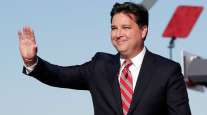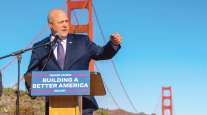Senior Reporter
Sec. Elaine Chao Stands Behind $1.5 Trillion Infrastructure Plan Amid Pushback

In her first appearance on Capitol Hill since the White House presented to lawmakers its $1.5 trillion infrastructure proposal, Transportation Secretary Elaine Chao sparred with Senate Democrats skeptical about the proposal’s funding goal.
Appearing March 1 before the Environment and Public Works Committee, Chao was challenged on the plan’s reliance on $200 billion in unspecified federal funds to achieve the topline $1.5 trillion over 10 years, primarily through nonfederal funds.
White House officials have said the proposal’s “principles,” unveiled Feb. 12, are meant to help guide legislation, but committee members were nonetheless pointed in their questioning.
RELATED: Chao hints more details coming soon on Trump plan
“The states tell us they’re cash-strapped and we know the vast majority of projects to repair or replace infrastructure will not attract private investment,” committee ranking member Sen. Tom Carper (D-Del.) said.

Carper by Zach Gibson/Bloomberg News
He also cited a Penn Wharton Budget Model analysis published last month that determined the White House had exaggerated its $1.5 trillion topline claim.
That analysis maintains that much of the new federal aid would lead to state and local governments increasing total infrastructure investment by less than the value of the aid itself. It estimates that total new infrastructure investment would increase between $20 billion to $230 billion, including the $200 billion federal investment.
Chao dismissed the analysis, telling Carper marketplace experts would best understand the White House’s $1.5 trillion claim.
“It actually takes people with real-life business experience to know how it works,” she said.
Chao also told the committee that administration officials had reviewed the performance of the U.S. Department of Transportation’s loan programs to conclude $1.5 trillion would be achievable under the proposal.
Chao batted back a question about President Trump’s reported support for a potential increase in fuel taxes.
Asked by Sen. Chris Van Hollen about Carper’s assertion that Trump during a Feb. 14 meeting with transportation leaders endorsed an increase, Chao said she would not “divulge conversations with the president.” She added the Trump administration would collaborate with Congress on identifying “pay-fors” — or funding mechanisms — for the proposal’s $200 billion ask.
“We’re talking about a $200 billion plan, which many of us think it’s already too small to start with. The leverage assumptions, many of us think are way off,” Van Hollen said. “But even that $200 billion is a hallucination until we have a real funding source.”
Sen. Ed Markey (D-Mass.), meanwhile, questioned the soundness behind proposing to shift long-standing transportation funding dynamics between states and the federal government by tapping the private sector to take on a greater role.
“My fear is, I’ll be honest with you, I just think that Wall Street will say, ‘Well, we’ll come in and help.’ But they’re going to have to be paid. And that’s going to be tolls,” Markey said. “I have a big problem with the math. I just don’t think it’s going to work.”
Democrats also criticized the proposal’s allocation for rural districts, and its push to streamline the permitting process for infrastructure projects.
The hearing came a few days after Republican leaders sounded doubtful whether an infrastructure bill would be considered this year. EPW committee Chairman John Barrasso (R-Wyo.) did not address the chances a bill would advance in the coming months.
Sen. Dan Sullivan (R-Alaska), suggested Congress meet during weekends, if necessary, to finalize a bill this year. His colleagues did not comment on his suggestion.
Much of the transportation community continues to urge lawmakers to approve a higher fuel tax and to advance a sustainable infrastructure funding package soon. Funding authority for federal transportation projects expires in less than three years.
Several groups, such as the U.S. Chamber of Commerce and the American Society of Civil Engineers, support a fuel-tax increase as a model for boosting the depleting Highway Trust Fund. Last year, American Trucking Associations proposed the establishment of the Build America Fund, which the group estimates could generate about $340 billion over 10 years through a 20 cents per-gallon built-in fee on transportation fuels.
The federal Highway Trust Fund, backed primarily by revenue from the excise tax on gas and diesel fuel, is used to assist states with infrastructure projects.




